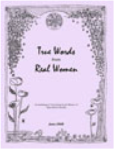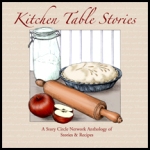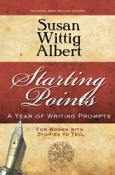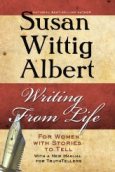Downriver View from Riehl’s (artwork and essay by Janet Grace Riehl)
Pop relaxes in his green lazy boy chair, even though he’s never been lazy—not even now when he’s feeling poorly. I stand next to his chair holding his hand surreptitiously taking his pulse as I look over our hill to the Mississippi below with Scotch Jimmy’s Island a long stone’s throw from the bank. My eye grazes over a bluebird house my brother built, the birds that fly towards one another for their pas de deux, and the bare black trees that filter my view of the river.
I’m singing along to a CD we recorded two weeks ago—cranked up loud so that he can hear. “I’ll Miss You When You’re Gone” and other love songs hold pride of place. My father increasingly quotes a line from one of his poems, “I cry not for my death / but for the music that will die with me.” He’s a repository of music from the 1920s through 1940s—tunes that are little known or no longer played. Music—even today’s music that seems to be everywhere—has to be played to stay alive. Even though we’ve endlessly documented this music from his youth—including by a Smithsonian Scholar—it can never be enough. Just as a life such as his could tick on forever and never be enough.
Life turns on a dime. I left Sunday night and Pop was fine. By Monday morning he was sick, but not deathly so. By late morning his blood pressure had dropped alarmingly, he struggled for breath, and his other vitals weren’t good. My niece Diane, bless her heart, was here in the morning and afternoon–despite her own family chaos and incalculable work stress. By this time she must have the equivalent of an advanced degree in Daddy’s medical condition. I drove back to Pop’s in the early afternoon. By the end of the day he was on hospice, and Diane finally went home. We’re not saying “hospice” to him just yet. We’ll see where it goes. He may yet bounce back as he’s done so many times before.
Currently we’re guessing it’s a lung infection—complicated by the 12 other things that are wrong with him of course. Hospice for now means two visits each week by a nurse. I asked her yesterday that there not be a chaplain involved. (Daddy has his own religion as we know.) And, that if a social worker needs to visit for their organizational needs, that they talk just to the family and not with him. Amidst the dysfunction that most families bear, ours is remarkably functional around Pop’s health and dying issues. We’ve gone through death before and we’ll make ‘er again.
So, his medications remain the same plus some tweaking. Oxygen is turned up to the max on the dial, and that clear plastic tube looks to be a round-the-clock accessory rather than just at night. He’s on ibuprofen and cough syrup not morphine. We’ve had a “no hospital” policy for some time—unless he were to break his hip or suffer something fixable—but no invasive procedures ever again. Right now we’ll just take it day by day. This morning he’s up and dressed, with some help, out of his bed and into the aforementioned chair where he eats his fried egg and raisin toast.
Because I put myself on a Rest Cure this past month, I have some reserves to bring to the situation. Coming back home to the Midwest from California after my sister Julia’s death in 2004— and then for keeps in 2007— was one of the biggest, best, and hardest decisions of my life. One phrase by a friend released me to make that decision: “Everyone deserves to know the truth about their lives.” And, this surely is where a big chunk of that truth resides.
________________
Read more about my father Erwin Thompson at Riehl Life: Village Wisdom for the 21st Century at www.riehlife.com. Just type his name in the search box. A bounteous archive of posts by him and about him will pop up.







